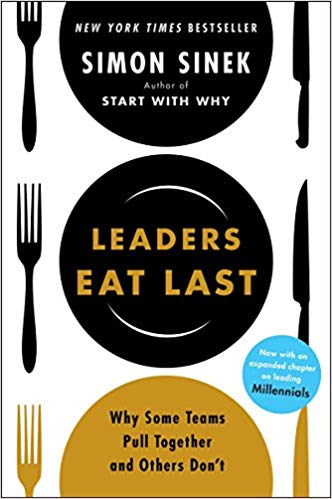
Leaders Eat Last: Why Some Teams Pull Together and Others Don’t by Simon Sinek tells stories about leaders who found success mainly by putting people first. Seeking short term gains and seeking to serve one’s own selfish interests is short-sighted and sure to fail over time. This book will help leaders in all fields be the type of leader they wish they had. This would be a great textbook for any leadership course. Be sure to get a copy for leaders you know.
Forward by George J. Flynn Lieutenant General, U.S. Marine Corps (Ret.)
- An organization’s success or failure is based on leadership excellence and not managerial acumen. These organizations have strong cultures and shared values and understand the importance of teamwork and trust. They understanding the importance of people and relationships. The true price of leadership is the willingness to place the needs of others above your own. You must know your people and realize that they are much more than an expendable resource. Good leaders truly care. Leaders who take care of their people can never fail.
Part 1 – Our Need to Feel Safe
- 1. Protection from Above: We start with a story about a pilot risking his life to save 22 men in Afghanistan. He said he was just doing his job and that empathy for others is the single greatest asset he had to do his job. “They would have done it for me.” Empathy helps you share your glory and help those with whom you work to succeed. This strong foundation leads to success that no amount of money, fame, or awards can buy. Exceptional organizations have cultures in which leaders provide cover from above and the people on the ground look out for each other thanks to empathy.
- 2.Employees Are People Too: By getting rid of time clocks, bells that signaled breaks and lunch, locks on boxes of spare parts, and replacing free anytime phones with asking for permission payphones one leader used trust to turn his company around. People offered to donate vacation days to an employee with family problems. The workers also took better care of the machines. This happens when leaders listen and avoid coercion. They treat workers like family and realize that everyone is someone’s son or daughter.
- 3. Belonging: The authors use the metaphor of The Circle of Safety. It’s like four oxen standing so that no matter which direction the lion comes from it will always be met be horns. After thirteen weeks of boot camp, Marines know that they can trust every other Marine to protect them. It’s important that everyone in an organization feel that way about every other member so that everyone feels as safe as possible. This will result in better collaboration and problem-solving.
- 4. Yeah, but…: Stress can have negative effects on one’s health so it’s important to avoid it as much as possible. The more control a person has the less likely they are to be stressed. Top leaders, therefore, do what they can to give workers control and to acknowledge their efforts. We also know that coming home angry from a job you hate will have a negative impact on your children. You may be better off with no job rather than one you hate.
Part 2 – Powerful forces
- 5. When Enough Was Enough: In order to survive, humans have had to rely on cooperation and mutual aid rather than competition. If we don’t look out for our group, our group won’t look out for us. Conversely, if we don’t take care of ourselves first, we won’t be of much use to others.
- 6. E.D.S.O: Four brain chemicals help us survive. Endorphins are the brain’s pain relievers. They give us a remarkable capacity for physical endurance. Dopamine causes a feeling of satisfaction when we accomplish something. It makes us a goal-oriented species. Together these two chemicals help us get things done. Serotonin gives us the feeling of pride we get when we perceive that others like or respect us. As social animals we need approval. This causes us to give of our selves. Oxytocin is the feeling of friendship, love, or deep trust. Without it, there would be no empathy. You get it when to do something nice for someone. Such behaviors make us happy and help us live longer.
- 7. The Big C: When something goes wrong or you don’t feel safe your body releases cortisol. It’s the chemical that causes feelings of anxiety, discomfort, or stress. It’s like an early warning system. If you work with a group where members don’t care much about one another’s fate cortisol starts to seep through your veins. It inhibits the release of oxytocin, the empathy chemical. One can adapt to regular doses of cortisol, but it isn’t good for one’s health. Here is a story of a company that adopted a no-fire policy. As a result, people communicated more openly and pointed out problems more quickly. Turnover shrank and people felt safe.
Part 3 – Reality
- 9. The Courage to Do the Right Thing: Here we have a story of an aircraft controller who broke the rules and saved many lives. The point is that you have to know when to break rules and that you need rules to keep things running well. Also, relationships aren’t really based on rules.
- 10. Snowmobile in the Desert: Snowmobiles don’t run so well in the desert. Sometimes amazing humans are like snowmobiles in the desert. Sometimes the harder we try to do things right the worse we feel. We need to get the environment right at work and at home and learn how to work together as nothing great was ever accomplished by a single person.
DrDougGreen.com If you like the summary, buy the book





